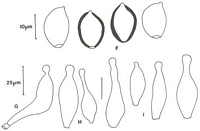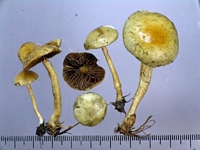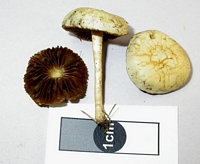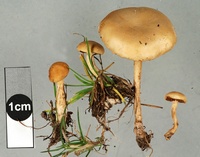|
 Agrocybe semiorbicularis Agrocybe semiorbicularis
SynonymsNaucoria semiorbicularis
Agaricus semiorbicularis
Agaricus pediades
Naucoria pediades
Agrocybe pediades
BiostatusPresent in region - Exotic
Images (click to enlarge) | 
Owner: J.A. Cooper | 
Owner: J.A. Cooper | 
Owner: J.A. Cooper | |
Article: Watling, R.; Taylor, G.M. (1987). Observations on the Bolbitiaceae: 27. Preliminary account of the Bolbitiaceae of New Zealand. Bibliotheca Mycologica 117: 61 p. + 17 pl.
Description: No descriptions of the macroscopic characters are available for New Zealand collections and therefore the determination is based solely on microscopic characters. For the characters of basidiomata in the field readers are referred to European literature, e.g. Walling (1982). A. semiorbicularis is delimited by the following combination of microscopic characters:
a. Broadly ellipsoid to ovoid basidiospores 10.5-14 x 7-8(-10) µm,
b. Basidia mostly 2-spored,
c. Absence of pleurocystidia and
d. Lageniform cheilocystidia with ± subcapitate head.
It is widespread on lawns and in grasslands. Details of the New Zealand collection are as follows;-
Basidiospores 14-16 x (8-)8.5-ll µm, ellipsoid-ovoid, medium ochraceous in water, darker in aqueous alkali, smooth; germ-pore distinct. Basidia 2-spored, a few 3- and 4-spored basidia seen, 25-30 x 7.5-10 µm. Cheilocystidia 20-30 x 5-7.5 µm, ampulliform with slightly swollen obtuse apex (3-5 µm broad); pleurocystidia absent. Caulocystidia subcapitate to slightly swollen at apex, 20-30 x 6-8 µm, apex 4-5 µm.
Notes: Agaricus semiorbicularis is recorded in the literature by both Colenso (1890) and Massee (1898).
Article: Massee, G.E. (1899) [1898]. The fungus flora of New Zealand. Transactions and Proceedings of the New Zealand Institute 31: 282–349 Wellington:.
Description: Pileus thin, convex, then becoming plane, obtuse, often more or less depressed, never
umbonate, dry, at length minutely rivulose or radially wrinkled, but never striate, yellowish-ochre, then pale tan-colour,
2.5-5 cm. across; gills adnexed, crowded at first, becoming rather
distant as the pileus expands, about 4 mm. broad, at first brownish, then dingy-cinnamon;
spores dingy-ferruginous, elliptical, 10-12 x 4 - 5 µ; cystidia fairly numerous, 30-50 x 8 -10
µ; stem 5-8 cm long, 2-4 mm thick, somewhat flexuous, silky, yellowish, base slightly
bulbous, stuffed with a distinct pith.
Habitat: Among grass.
Distribution: New Zealand. Australia, Ceylon, South Africa, Europe, Siberia, United States.
Notes: Allied to Naucoria sideroides. For distinctive features, see note under last-named species.
|